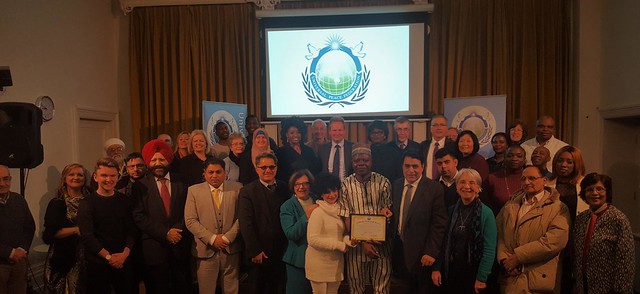London, United Kingdom—The power of people of faith to solve the world’s crises was the theme of the 2018 celebration of World Interfaith Harmony Week.
On the evening of February 7, 2018, UPF members, Ambassadors for Peace and newcomers gathered at the UPF-UK offices for an event titled “Considering a Principled, Interfaith Approach to Discrimination, Ethnic Cleansing and Genocide.”
Robin Marsh, secretary general of UPF-UK, warmly welcomed the participants, expressing the necessity of dialogue between the religious and political spheres. Great religious leaders fulfill their calling by reaching out to those of other faiths, he said. His passion for interfaith set the tone for the evening.
The first speaker was the Rev. Dr. Marcus Braybrooke (Video), the co-president of the World Congress of Faiths and an active UPF member since the 1980s. He has devoted much of his life to interfaith efforts. At the start of his speech, he led us in a minute’s silence to consider victims of genocide. When faced with such human behavior, he said, it is easy to give up hope. However, the message of all religions is the message of hope, he said: When we maintain hope despite adversity, we can bring about a change for the better.
The event took place in the same week as the centenary of women’s suffrage in the UK, which Dr. Braybrooke called an outstanding example of perseverance. “God needs our help,” he told us, as he urged religious people of expertise to deal with practical issues in society, rather than speak only of generalities. He left us with a call to arms of sorts, encouraging the audience to “change the world and begin with me.”
Following this, Rev. Dr. David Hanna (Video), the regional chair of UPF for Northern Europe, offered his thoughts on the importance of interfaith in a talk titled “The Necessary and Universal Application of Religious Insight.” Dr. Hanna explained that the religious life is one of respect for the sacred rights of all human beings. When we consider even those on the other side of the world as if they were family, our sphere of concern becomes broader and our love for others is no longer exclusive to the family.
He also discussed the moral ambiguity of our times, in which ideals are often defined by the lowest common denominator, as everything has become relativistic. In his experience, adherence to high ideals in the modern world is often condemned as naïve and unrealistic. He stressed that religious ideals can bring change in society, but they must start with love in the family, a love that expands to ever higher levels.
Humphrey Hawksley, (Video) a renowned journalist, author and commentator, spoke next, discussing the contents of his upcoming book, Asian Waters, in which he seeks to deconstruct the complex geopolitical situation of the South China Sea. Addressing the theme of the event, he expressed that governments with weak institutions depend upon ethnicity rather than principles, citing the present state of Myanmar and its government's complicity in the ethnic cleansing of the Rohingya.
Sister Elizabeth O’Donohoe (Video) of Westminster Interfaith offered her perspectives on interfaith. She distinguished between religion and faith, describing religion as bringing out our tribal nature, with its proclivity to subdivide, whereas faith is something more personal; as such, she believes the harmony of faiths is far more likely than the harmony of religions.
In reference to the many refugee crises around the world in 2018, she spoke of St. Francis of Assisi, who is said to have attempted interreligious dialogue with the sultan of Egypt during the Crusades, more concerned for the lives of God's children than being identified by the sultan’s army as an enemy spy. She stressed the necessity of such dialogue, and said we are most fundamentally all children of the same God, before we are our religion, creed or race, also relating to current events in Myanmar. She ended her speech warning that the realism of international politics must avoid cynicism and the globalization of indifference: We ought to have the same concern for those across the globe as we have for our family.
After this, UPF Directors Robin Marsh and Margaret Ali presented Ambassador for Peace awards to Abdul Bassith Syed Ibrahim and Jamil O. Eniola for reaching out to the wider community and in recognition of their outstanding humanitarian work. The new Ambassadors for Peace expressed their gratitude for receiving the awards and discussed the importance of interfaith.
We were fortunate to hear several more words of encouragement. Firstly Shokat Ali, (Video) the chair of British Muslim Friends of Labor, urged us to unite together and pray for a peaceful and prosperous world. Afzal Choudhry, a commentator, inter-religious scholar and businessman, spoke of the fundamental congruence of all religions and stressed that all people are born same way and all die, regardless of religion, race or creed, so we should treat one another with respect. Liz Arif-Fear, the founder of the Voice of Salam, human rights and interfaith activist, delivered an impassioned speech, tackling issues that religious people face today. She urged members of faiths to call to account religious leaders in their communities who promulgate extremist ideology. She stressed that violence and hatred have no faith, but faith must play a major role in tackling these issues in the political, social and cultural spheres.
To wrap up an insightful and inspiring evening, Robin Marsh, (Video) stated that love of God should be a unifying, not a divisive, factor; the essence of interfaith is that we all have the same God, who is our friend, our lover, our parent. When one comes to truly appreciate the love and mercy of God, one feels blessed. Blessing can be maintained only by being shared; the more one shares it, the broader one’s capacity becomes to receive even greater blessing. In his estimation, a life of faith consists of sharing our blessings.

